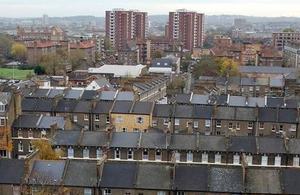Report raises concerns over new asylum contracts, including widespread use of hotels during Covid pandemic
Parliament's Public Accounts Committee on Friday published a report examining the delivery and performance of contracted-out housing and support services to people seeking asylum.
 Image credit: UK GovernmentThe 22-page report can be read here.
Image credit: UK GovernmentThe 22-page report can be read here.
New contracts for asylum accommodation and support services were introduced by the Home Office in late 2019, replacing the previous regional COMPASS contracts.
Overall, the Public Accounts Committee finds that the new contracts are costing more and are not yet delivering what has been promised.
The report states: "These new contracts are in their early stages but there is still a long way to go before services for asylum seekers deliver all that was promised by the Home Office. The Department let the new contracts and transferred services on time, but its lack of preparation and failure to share data meant elements of the new services were set up to fail. The failure to have effective services fully up and running in the first year has had a significant impact on the lives of asylum seekers. The Department is unacceptably vague about its plans to improve services, and lacks an effective line of sight into how services are delivered locally."
The Committee also highlighted concerns over the provision of accommodation during the coronavirus pandemic.
The report says: "The Department's widespread use of hotels through the COVID-19 pandemic was done at speed for obvious reasons. But the pace at which the Home Office needed to work did not excuse the lack of discussion with local authorities and local NHS bodies about how to manage this resettlement in their areas. MPs across the UK have raised concerns about this lack of local discussion with the Committee. Too often it meant that some vulnerable people, including families with children, have been living in accommodation that did not meet their needs for far too long—and risks masking an underlying problem in ensuring adequate accommodation for people when they first apply. The Department is paying an estimated 28% more to providers than COMPASS, and now needs to assure itself and demonstrate it is getting value for both the taxpayer and those who rely on its services."
Meg Hillier, the Chair of the Public Accounts Committee, said:
"MPs from across the country responded to this inquiry with examples of lack of consultation and information when large numbers of people were moved into hotels in their area at pace. Quite simply, there was a wholly unacceptable failure of the Home Office to communicate with local authorities and health services as they rapidly shifted hundreds of asylum seekers into hotel accommodation. In some cases people who had contracted Covid-19 were moved to another borough without the authorities being informed. Even at the pace of events there was no excuse for this lack of communication.
"The Home Office has cranked up the payments for these new contracts – now it must prove it can correspondingly crank up performance and deliver at least decent, suitable accommodation and services to people fleeing war and persecution to seek asylum in this country."
In response to the Committee's report, the Refugee Council's Andy Hewett said:
"Sadly this report reinforces what we already know – extended stays in hotel accommodation are causing real suffering for families and individuals in the asylum system. This is hugely damaging as it means they can't access basic services like GP appointments, or send their children to school.
"It's particularly concerning that the Home Office failed to put in place a safeguarding framework as part of the contracts – this is a critical step in ensuring people seeking asylum receive the right type of accommodation for their needs.
"The failure of the Home Office and its providers to consult and communicate with local authorities and other key stakeholders on the use of hotels is a recurring issue. We support the recommendations made by the Public Accounts Committee in this report: the Home Office must set out a clear plan on how it will quickly and safely reduce the use of hotel accommodation, work closely with local stakeholders (including local authorities, the police and NHS bodies), and publish a robust safeguarding assurance framework to ensure the safety of people living in asylum accommodation."
PA Media (formerly the Press Association) reported that the Home Office said it was considering the report's recommendations before responding.
A Home Office spokesman told PA that it had worked tirelessly over recent months to provide suitable accommodation to asylum seekers and the temporary use of hotels was necessary due to increased demand during the coronavirus pandemic. Longer-term accommodation was being arranged.